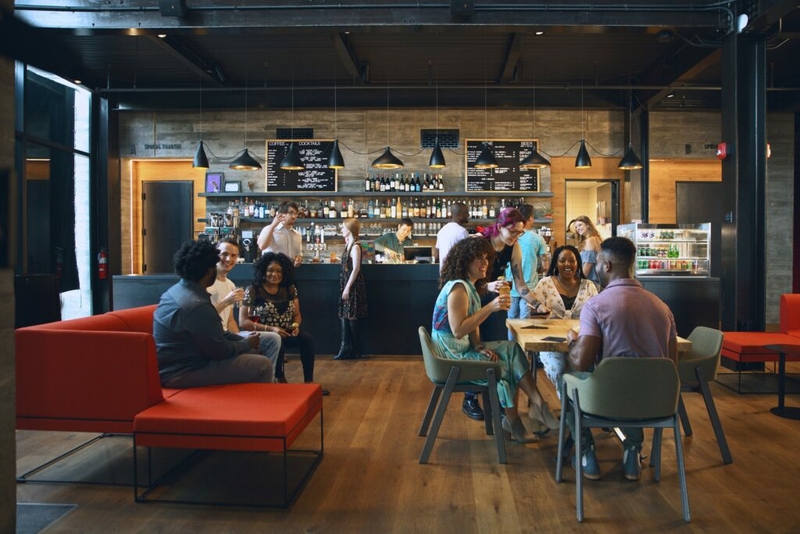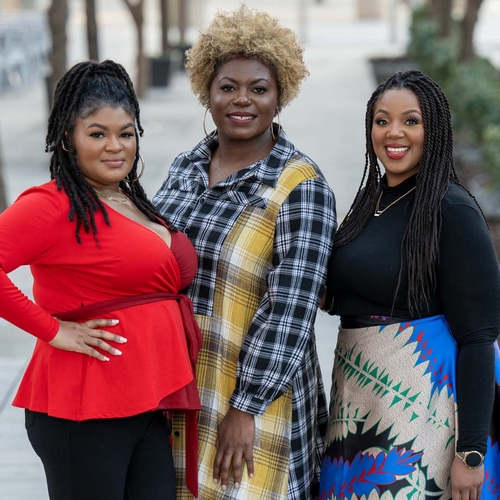Migration to NW Arkansas fuels state’s population growth in 2022

BENTONVILLE, Ark. – Jasmine Hudson never thought she would be a long-term Arkansas resident after moving to the Bentonville area to take a job with Walmart Inc.
The Tennessee State University graduate joined the Arkansas retail giant nearly a decade ago. She left the company during the COVID-19 pandemic to start her own business with two Black partners who also migrated to Northwest Arkansas.
Hudson is now co-founder and chief merchandising officer for Black Paper Party, a fast-growing online retailer borne out of a love of Black culture and the recognition that imagery of Black families and their experiences are underrepresented during Christmas and other holidays.
She and the two other Black Paper Party co-founders, Madia Willis and J’Aaron “Jae” Merchant, recently expanded their 2022 holiday collection into some of the nation’s biggest retail brands, such as Target, T.J. Maxx, Walmart and Family Dollar. The Black-owned online retailer touched over $1 million in sales in 2022 and expects to reach $5 million over the next five years.

Hudson might never have gained experience in the retail sector or met her business partners if she hadn’t taken a leap of faith and moved to northwest Arkansas, now one of the fastest-growing metropolitan areas in the U.S.
However, the Tennessee HBCU graduate said she is still trying to navigate in a community that is 94% white.
“Black people (here) do not necessarily feel as though they can call northwest Arkansas home because they are not represented in the community through business or events on a regular basis,” said Hudson, who also maintains the Black-Owned NWA social networking platform.
The Natural State migration
According to new U.S. Census population data released in late 2022, Hudson is among the growing number of out-of-staters who have moved to Arkansas as the state’s population jumped by 34,082 to 3,045,637 during the pandemic. Arkansas’s population officially topped 3 million for the first time in 2017, ranking it as the 33rd largest state, ahead of Mississippi and behind Nevada.
Migration also played a big role in an increase in the national population.
“There was a sizable uptick in population growth last year compared to the prior year’s historically low increase,” said Kristie Wilder, a demographer at the Census Bureau, part of the U.S. Department of Commerce. “A rebound in net international migration, coupled with the first year-over-year increase in total births since 2007, is behind this increase.”
After a historically low rate of change between 2020 and 2021, the U.S. population increased by 0.4%, or 1,256,003, to 333,287,557 in 2022, census data shows. Net international migration — the number of people moving in and out of the country — added 1,010,923 people between 2021 and 2022 and was the primary driver of growth.
Net international migration represented 168.8% growth over the 2021 total of 376,029, indicating that migration patterns are returning to pre-pandemic levels, Census officials noted. Positive natural change, which includes births minus deaths, increased the national population by 245,080.
From Apr. 1, 2020, to Jul. 1, 2022, Arkansas’ growing population base saw net migration of 38,055 from the other 49 states and 4,754 foreign-born residents moving to the Natural State, resulting in net migration of 42,809.
That total was partly offset by a “natural change” decline of 8,980 Arkansas residents, as the number of deaths at 88,854 during the two years was greater than the number of births (79,874).
“Since the natural change is negative (with) more deaths than births, if we didn’t have a positive net migration at an amount to offset and counteract the natural change, then we would not be gaining population,” said Alison Wright, chief demographer for the Arkansas Data Center at the University of Arkansas at Little Rock’s state Economic Development Institute (AEDI).
The data released by the Census Bureau on Dec.29 did not include demographic details. The bureau will release early this year estimates of the 2022 population for counties, cities and towns, and metropolitan and micropolitan statistical areas, as well as national, state and county population estimates by age, sex, race and Hispanic origin. In May, additional demographic data will be released to provide more in-depth statistics on race and ethnicity, including detailed population data on nearly 370 racial and ethnic groups living in the U.S.
Diversity challenges
If Arkansas’s recent population trend follows the past two decades, incoming demographics data will likely show the state’s new growth is mainly in Benton and Washington counties, but those residents moving to the region are more diverse, said Nelson Peacock, president and CEO of the influential Northwest Arkansas Council (NAC) in Bentonville.
Started by Sam Walton, Don Tyson, J.B. Hunt, and other business leaders, the business-focused council’s primary role locally has been to lure new talent to northwest Arkansas and promote the improvement of physical infrastructure, health care, and quality of life.

“From the council’s perspective, we released a report at our summer meeting where we talked about being at an inflection point of continuing to grow, and needing to grow for our continued future economic success,” Peacock said. “We have to do the things that help maintain the character of northwest Arkansas and what people like about it. That means keeping housing costs low and staying ahead on infrastructure projects.”
Based on census data provided by the Bentonville business council, about 30 people are moving into Benton and Washington counties daily. Population estimates from the most recent 10-year census show the state’s second and third-largest counties grew by more than 105,000 residents.
Benton County’s population reached 284,333, up from 221,339 a decade ago, an increase of 62,994, or 28.5%. Washington County’s population climbed from 203,065 to 245,871, an increase of 42,806, or 21.1%. Those numbers are in step with a 2019 report by AEDI highlighting demographic population projections for Benton and Washington Counties using age, gender, birth, death and migration statistics. Based on this methodology, AEDI projected the population of Benton and Washington Counties would reach 974,275 people by 2045.
“You certainly feel that data reflected here on the ground. Just driving down the road, you will see a new construction site like every other block, so there is certainly a lot of growth and in-migration to (northwest Arkansas),” said Peacock, an Arkansas expatriate and former Obama administration aide who moved back to the state in 2017 to lead the regional business council.
Noting the growth of the region’s Hispanic and Black communities over the last decade, Peacock said the council is working with each local city to address their specific diversity needs. For example, he said, Rogers and Springdale now have majority-minority school districts driven by the rapid growth of the region’s Hispanic population.
“You go back to the early 1990s when it was 90% white up here, so you are looking at a lot of change coming just in terms of growth, yes, but demographically as well,” he said.
For Hudson and other Black corporate professionals, there are still some difficulties in settling into the fast-growing area. Most Black migrators to northwest Arkansas usually have ties to the corporate community in the Bentonville area or the University of Arkansas at Fayetteville, said Hudson, noting that she still feels anxious in a public setting.
“When you’re out, the community is so small that you always feel as though you’re at work. In some cases, Black community members don’t feel as though they can truly be themselves beyond the corporate code switch until they get home,” Hudson said, noting that the Black population remains exceedingly small at 2% and 3.7% in Benton and Washington counties, respectively.
In the 2020 decennial census, Little Rock became the state’s first city to surpass 200,000 residents for the first time in Arkansas history. According to the 2020 Census, Little Rock’s population was 202,591, up 4.69% from 193,524 a decade earlier.
The pandemic-hit 2020 census count also noted that the Arkansas capital city has become more diverse as more local residents identify as belonging to “two or more races.” Those identifying as “white alone” now comprise 44% of the population, while all other single and multiracial categories include 56% of the city’s residents, census data shows.
“By looking closely at this data, we see that Little Rock is beautifully diverse and that diversity has grown since 2010,” said Mayor Frank Scott Jr.








